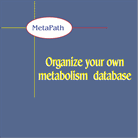
METAPATH
Consolidation and management of metabolism data
The MetaPath platform is developed to collect, organize and analyze experimental data on metabolism or catabolism, observed biotransformation pathways and crucial supporting metadata. Thus, the results from metabolism studies are compiled and organized into a systematic database. The system provides a set of tools for managing and accessing the information, including powerful search engine that can extract information based on chemical structure, biotransformation, experimental metadata and specific proteins responsible for a given biotransformation.
The platform was developed by LMC in collaboration with US EPA, Office of Research and Development (ORD) and the US EPA Office of Pesticide Programs (OPP). Within the scope of the project a set of customized screen editors called Composers were developed to automate data entry into MetaPath. These composers streamline the information from US EPA specific study summaries such as the Data Evaluation Records (DER) used by the US EPA Office of Pesticide.
Currently, efforts are underway through an Organization for Economic Co-operation and Development (OECD) work group to extend the use of DER Composers as harmonized templates for rat metabolism, livestock residue, plant residue and environmental degradation studies. These efforts are being coordinated by the MetaPath Users Group (MUG), a subgroup of the OECD Working Group on Pesticides. The main collective goal of the MUG is to harmonize the QA protocols and checklists developed for efficient standardized and accurate data entry on metabolism or catabolism.
CONTRIBUTORS:
United States Environmental Protection Agency (USEPA)
USEPA via its ORD/NHEERL, ORD/NERL and OPP divisions is the initiator of the MetaPath project. USEPA supported the project both financially and methodologically for more than a decade, defined the main features and functionalities in the system and supervised the development process. Efforts were put towards harmonizing the data content with the regulations in different countries and making the system acceptable worldwide.
The agency also supported the development of the MSS Composers - satellite programs built to facilitate the creation and editing of metabolism study summaries.
European Food Safety Authority (EFSA)
Through contracts NP/EFSA/PREV/2020/01 and NP/EFSA/PRES/2020/01, EFSA funded modifications in both MetaPath and the MSS Composers. The changes included the development of new features (e.g. allowing users to define custom identifiers for documents and substances), bug fixes and other improvements.
Within the last contract, the MSS Composers were further improved with features for pasting Excel tables into the Composers' tables and for batch loading of MOL and SMILES files into Appendix 2.
Through contract CO 102051 BASF SE funded modifications allowing users to use generic (Markush) structures and to export tables into MS Excel files.
COMPARISON BETWEEN IUCLID, METAPATH AND TOOLBOX IN TERMS OF METABOLISM INFORMATION:
IUCLID (International Uniform Chemical Information Database):
- Purpose: Primarily used for recording, storing, and exchanging data on chemical substances in the context of regulatory requirements, especially REACH.
- Metabolism: Allows users to record and manage data for the metabolic pathways of chemical substances in various organisms, including information on biotransformations and metabolic profiles.
- Purpose: Developed to consolidate and manage data for documented metabolism of chemical substances.
- Metabolism: Managing database with documented metabolism is the main purpose of this application. MetaPath provides tools for create, edit, compare, search etc. databases with documented metabolic maps.
- Purpose: A versatile platform for managing and analyzing chemical data, grouping chemicals into categories and fill data gaps.
- Metabolism: Toolbox provides tools for visualizing and interpreting metabolic data in the context of accessing chemical properties by analysing properties of their metabolites.
RESOURCES:
Related downloads:
MetaPath v. 5.4.3 (installation)
*The Composers in this package display v.1.13 in their title bar. The correct version number (1.14) is shown in the file details.
RELATED INFORMATION:
What's new in MetaPath and MSS Composers
How to use common fragments in MetaPath (tutorial)
MetaPath platform: Kinetic data layer (presentation)
MetaPath platform: Kinetic data layer (video)
MetaPath platform: Using common fragments (video)
